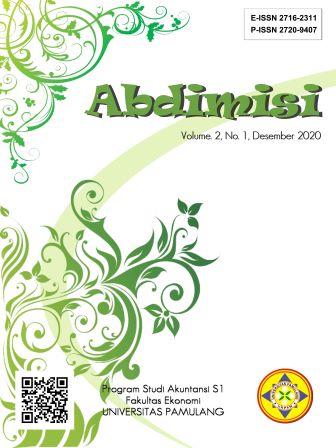Menjaga Kelangsungan Bisnis dengan Aplikasi Knowledge Management System pada CV. Kahati Ciptaning Bhumi - Beji, Depok
DOI:
https://doi.org/10.32493/abms.v3i2.22086Keywords:
Kitchen Set, Knowledge Management, Promotion, MarketingAbstract
Currently, kitchen sets are very popular. One of the business actors in making kitchen sets is Mr. Ahadi Cahya Pratama who in 2020 started a service business for making interior, kitchen sets and custom furniture with a CV. Kahati Ciptaning Bhumi, Depok. The main problem faced is how to save the expertise and experience of the experts because they are worried that the experts may move to other companies, or die. The approach method used in PKM activities is brainstorming, presentation and discussion. There are several solutions that we offer, namely regarding the importance of forming a business entity, how to use social media for promotion, how to manage business finances, and how organizations store expertise and experience to maintain business. The expectations generated from this PKM are: 1) increased sales with marketing technology-based, 2) Expertise’s expertise and experience can be stored safely, and 3) better financial bookkeeping.
References
Akgün, A. E., Keskin, H., Ayar, H., & Okunakol, Z. (2017). Knowledge sharing barriers in software development teams: A multiple case study in Turkey. Kybernetes.
Astorga-Vargas, M. A., Flores-Rios, B. L., Licea-Sandoval, G., & Gonzalez-Navarro, F. F. (2017). Explicit and tacit knowledge conversion effects, in software engineering undergraduate students. Knowledge Management Research & Practice, 15(3), 336-345.
Aulawi, H., Ramdhani, M. A., Slamet, C., Ainissyifa, H., & Darmalaksana, W. (2017). Functional Need Analysis of Knowledge Portal Design in Higher Education Institution. International Journal of Soft Computing, 12(2), 132-141.
Bandera, C., Keshtkar, F., Bartolacci, M. R., Neerudu, S., & Passerini, K. (2017). Knowledge management and the entrepreneur: Insights from Ikujiro Nonaka's Dynamic Knowledge Creation Model (SECI). International Journal of Innovation Studies, 1(3), 163-174.
Dewi, L. P. (2019). Implementasi Peraturan Presiden Nomor 13 Tahun 2018 dalam Pendirian Perseroan Terbatas. Acta Comitas: Jurnal Hukum Kenotariatan, 4(1), 1-10.
Farnese, M. L., Barbieri, B., Chirumbolo, A., & Patriotta, G. (2019). Managing knowledge in organizations: A Nonaka’s SECI model operationalization. Frontiers in Psychology, 10, 2730.
Kingsnorth, S. (2019). Digital marketing strategy: an integrated approach to online marketing: Kogan Page Publishers.
Liew, A. (2007). Understanding data, information, knowledge and their inter-relationships. Journal of knowledge management practice, 8(2), 1-16.
Odom, S. (2015). SEO for 2016: The complete do-it-yourself SEO guide.
Omidvar, M. A., Mirabi, V. R., & Shokry, N. (2011). Analyzing the impact of visitors on page views with Google analytics. arXiv preprint arXiv:1102.0735.
Ouriques, R. (2019). Understanding and Supporting Knowledge Management in Agile Software Development. Blekinge Tekniska Högskola
Thanachawengsakul, N., Wannapiroon, P., & Nilsook, P. (2018). How A Digital Knowledge Engineering Learning Process Can Enhance Technical Skills In Software Engineering.
Turban, E., Pollard, C., & Wood, G. (2018). Information Technology for Management: On-demand Strategies for Performance, Growth and Sustainability: John Wiley & Sons.
Downloads
Published
Issue
Section
License
Copyright Notice
Authors who publish with this journal agree to the following terms:
- Authors retain copyright and grant the journal right of first publication with the work simultaneously licensed under a Creative Commons Attribution License that allows others to share the work with an acknowledgement of the work's authorship and initial publication in this journal.
- Authors are able to enter into separate, additional contractual arrangements for the non-exclusive distribution of the journal's published version of the work (e.g., post it to an institutional repository or publish it in a book), with an acknowledgement of its initial publication in this journal.
- Authors are permitted and encouraged to post their work online (e.g., in institutional repositories or on their website) prior to and during the submission process, as it can lead to productive exchanges, as well as earlier and greater citation of published work (See The Effect of Open Access).
Abdimisi have CC-BY-SA or an equivalent license as the optimal license for the publication, distribution, use, and reuse of scholarly work.
In developing strategy and setting priorities, Abdimisi recognize that free access is better than priced access, libre access is better than free access, and libre under CC-BY-SA or the equivalent is better than libre under more restrictive open licenses. We should achieve what we can when we can. We should not delay achieving free in order to achieve libre, and we should not stop with free when we can achieve libre.
You are free to:
- Share — copy and redistribute the material in any medium or format
- Adapt — remix, transform, and build upon the material for any purpose, even commercially.
- The licensor cannot revoke these freedoms as long as you follow the license terms.

